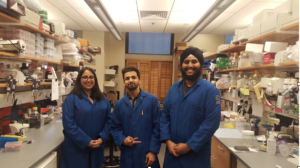UC Berkeley students use CRISPR to edit the flavor of this common food
Don’t like the aftertaste of a certain type of food? A group of students at UC Berkeley’s Sutardja Center for Entrepreneurship and Technology might be able to help you edit it out using CRISPR technology.
As a part of SCET’s Alternative Meats Lab, Paramjyot Panesar, Juliet Hemmati and Fardeen Nekmard have been working this semester to eliminate the beany and bitter aftertaste of pea protein by editing the plant’s genes. Their project could mean a major breakthrough in the world of plant-based proteins.
“Our current level of meat consumption as a species is not sustainable,” Nekmard said. “And a plant-based protein with no bitter taste offers us a ‘saving grace’ by providing an almost fresh start toward a brighter, healthier future.”
As the land and water resources needed to support global meat consumption at its current rate are growing scarce, many scientists and food entrepreneurs are looking to create realistic plant-based alternatives that mimic the flavor, texture and nutrition of meat. Startups like Impossible Foods and Beyond Meat have popped up in Silicon Valley in recent years to try to solve this problem.
But currently a large majority of plant-based meats use soy as their main source of protein, which has recently received bad press from scientists who claim that the crop may have negative health benefits and lead to hormone imbalances.
Peas not only lack this bad press, but they are also protein rich and are easy to grow. The only drawback is that pea protein’s bitter flavor after processing might cause your nose to scrunch up.
According to Hemmati, several food companies have expressed interest in using pea protein instead of soy protein in their products –– if someone could find out how to eliminate that aspect of the protein’s taste.
The students, who have named their startup CRISPea, realized that they could use a type of gene-editing technology called CRISPR that was developed by a UC Berkeley professor in 2012 to “knock out” the gene responsible for pea protein’s bitter flavor.
Panesar, Hemmati and Nekmard –– who study integrative biology, molecular cell biology, and chemistry, respectively — spent the first month and a half of their project reading through science literature to find out what gene in particular was responsible for causing the bitter taste in pea protein.
After that they started working in the lab with Jamie Cate, the husband of CRISPR creator and UC Berkeley professor Jennifer Doudna. By the end of the semester they had successfully proven that their experiment would work by carrying it out in a test tube.
“Even though (CRISPR) technology has been in place for a few years now, there are few applications of it,” Hemmati said. “There’s a lot of room to grow in that area.”
All three of the students on the team plan to continue working on the project in some capacity. Now that he is graduating, Nekmard plans to work on CRISPea full time.
Next up, they’ll be working to edit the genes of a real pea plant to show that their project doesn’t only work in a test tube, but also in real life. If they can edit the genes of one pea plant they can then go on to breed it so it can reproduce more pea plants that lack a bitter or beany aftertaste.
Overall, the students believe that their project has the power to change the alternative meat industry and to forge the path for a more sustainable world.
“I see it as selfish if we just don’t care and start eating something that is not good for the environment and for our health,” Nekmard said. “The goal is not just to make plants tasty but also to help reduce the impact from animal farming.”
SCET’s Alt.Meat Challenge Lab encourages students to find innovative solutions to problems facing the plant-based meat and clean meat industries.
